商务英语作文三篇
商务英语作文
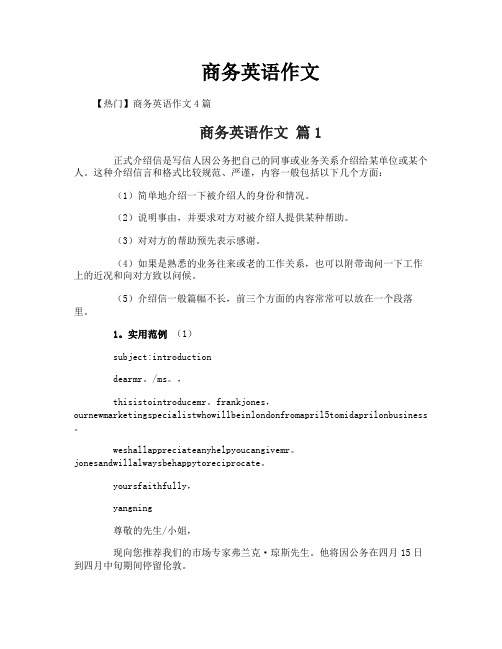
商务英语作文【热门】商务英语作文4篇商务英语作文篇1正式介绍信是写信人因公务把自己的同事或业务关系介绍给某单位或某个人。
这种介绍信言和格式比较规范、严谨,内容一般包括以下几个方面:(1)简单地介绍一下被介绍人的身份和情况。
(2)说明事由,并要求对方对被介绍人提供某种帮助。
(3)对对方的帮助预先表示感谢。
(4)如果是熟悉的业务往来或老的工作关系,也可以附带询问一下工作上的近况和向对方致以问候。
(5)介绍信一般篇幅不长,前三个方面的内容常常可以放在一个段落里。
1。
实用范例(1)subject:introductiondearmr。
/ms。
,thisistointroducemr。
frankjones,ournewmarketingspecialistwhowillbeinlondonfromapril5tomidaprilonbusiness 。
weshallappreciateanyhelpyoucangivemr。
jonesandwillalwaysbehappytoreciprocate。
yoursfaithfully,yangning尊敬的先生/小姐,现向您推荐我们的市场专家弗兰克·琼斯先生。
他将因公务在四月15日到四月中旬期间停留伦敦。
我们将非常感谢您向琼斯先生提供的任何帮助,并非常高兴施以回报。
商务英语作文篇2跟商业行业或者是商业现象的发展经济等等有关系,出题的形式可以是图表英语,也可以是提纲作文。
不论是哪种形式作文,只有第一段写作方式是不一样的,比如说图表中你要进行图表描述,最后要进行描述,但是二三段的论述和结论其实都一样,那么在这里来看几个例子。
第一个是我们说的食品安全问题。
那如果是出到这种类似于社会比较负面的作文的话,主要的写作方式就要对这种现象进行分析,对它的'原因进行解释,对它的根源进行探索,为什么食品安全频发?我们给观众稍微列了几个提纲,比如说食品安全问题频发第一个原因,是因为这些食品的生产商他们缺乏责任意识,所以在生产的时候不顾忌消费者的食品安全。
商务英语写作案例参考范文

商务英语写作案例参考范⽂ 写好商务英语写作不是⼀件简单的事,除了要有好的英语基础,还需要知道商务英语写作需要到哪⼀些格式,这个时候就需要⽤到范⽂,百分⽹店铺在这⾥为⼤家寻找到了5篇商务英语写作的`范⽂,希望你看完之后可以写出好的商务英语作⽂! 商务英语写作参考范⽂⼀ Dear Sirs, This is to introduce ourselves as one of the biggest down apparel product companies from China. Our company—Jiangsu Bosideng International Holdings Limited .—was established in 1994,locating in the Bosideng Industrial Park, Guli Town Changshu, Jiangsu Province, China. From 1994,we have been specialized in producting down apparel. Bosideng International Holdings Limited has 8344 retail outlets selling down apparel under its six core brands including "Bosideng","Snow Flying","Bingjie","Slim"and"Shuangyu".Through these brands,the Company offers a wide range of down apparel products targeting various consumer segments to strengthen and expand its leading position in China down apparel industry. To further optimize its product mix and increase profitability,the Company has adopted a "non-seasonal product"development strategy. The Company will continue to seek opportunities to merge and acquire non-down apparel brands with high development potential and good reputation in order to further increase the proportion of non-down apparel business in total sales. With decades of experience of trading with both domestic and international companies,we have been enjoying high reputation in the world market, both for our good credit and our high product quality.Surely,we also have quality assurance and quality control,which greatly protect the benefits of the customer. Our telephone number is 400-887-8226/0512-********,the fax is 0512-********. We look forward to your positive reply. Yours faithfully. 商务英语写作参考范⽂⼆ Dear Mr.Downe I am pleased to be able to invite you to the Launch of English Tomorrow, the exciting new multi-level CD-ROM program for business English learners. English Tomorrow is published by Talk International in cooperation with Bookers Publishers. The official launch will take place at 3 pm on 25th July at The Royal Bell Hotel, South Harford, Somerset. During the afternoon there will be an opportunity for you to try out the material. Moreover, the designers-Mark Brightman and Sally Waters, and representatives of Bookers Publishers will be present to answer any questions you may have. I hope your schedule will allow you to accept our invitation. I would be grateful if you could confirm your attendance by 20 June at the latest and look forward to hearing from you.。
商务英语文章(带中文翻译)5则范文

商务英语文章(带中文翻译)5则范文第一篇:商务英语文章(带中文翻译)(一)World economyThe jobs crisis 失业危机It’s coming, whatever governments do;but they can make it better or worse不论政府如何努力,失业危机已经到来。
不过政府可以在这场危机中起到关键作用Illustration by Belle MellorNOTHING evokes the misery of mass unemployment more than the photographs of the Depression.You can see it in the drawn faces of the men, in their shabby clothes, in their eyes.Their despair spawned political extremism that left a stain on society;but it also taught subsequent generations that public policy has a vital part in alleviating the suffering of those who cannot get work.Thanks to welfare schemes and unemployment benefits, many of which have their origins in those dark days, joblessness no longer plunges people into destitution, at least in the developed world.再没有什么比关于经济大萧条的照片更能让人体会大量失业的痛苦。
商务英语小短文五篇范文

商务英语小短文五篇范文第一篇:商务英语小短文Jason: Good morning.My name's Jason Smith.Interviewer: Ah, good morning, Mr.Smith.Nice to meet you.I'm Peter Anderson from Personnel.Do sit down.Jason: Thank you very much.Interviewer: Now, have you brought your curriculum vitae with you?Jason: Oh, my curriculum.Yes, here it s.There are three copies.Interviewer: Have you brought your certificates as well?Jason: No, I haven't.I'm awfully sorry.Can I send them to you?Interviewer: Yes, that'll be all right.Well, please tell me about your working experience.Jason: I haven't been involved in international business, so I don't have any experiences, but I am diligent and I learn very fast.Interviewer: OK, so do you think you can make yourself easily understood in English?Jason: Yes, in most circumstances.Interviewer: Are you available for business travel?Jason: Yes, I am young, and unmarried.It's no problem for me to travel frequently.Interviewer: OK.You are good.Hope to see you next time.I'll call you if you get picked for next test.Jason: Thank you very much.I'm looking forward to your call.听看学杰森:早上好,我叫杰森?史密斯。
商务英语范文通用14篇
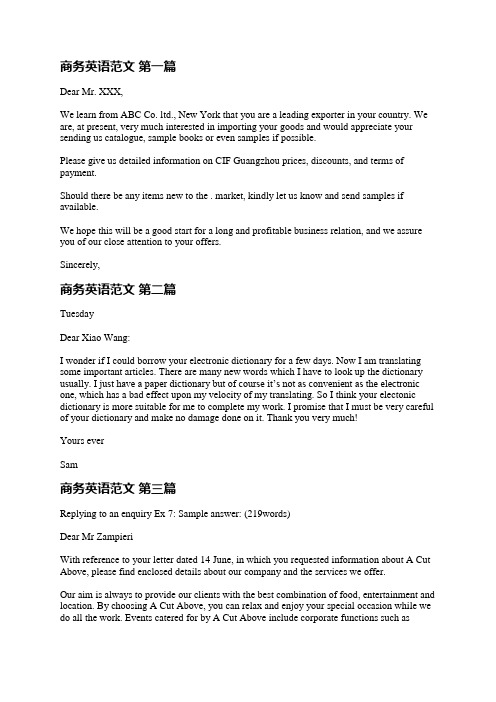
商务英语范文第一篇Dear Mr. XXX,We learn from ABC Co. ltd., New York that you are a leading exporter in your country. We are, at present, very much interested in importing your goods and would appreciate your sending us catalogue, sample books or even samples if possible.Please give us detailed information on CIF Guangzhou prices, discounts, and terms of payment.Should there be any items new to the . market, kindly let us know and send samples if available.We hope this will be a good start for a long and profitable business relation, and we assure you of our close attention to your offers.Sincerely,商务英语范文第二篇TuesdayDear Xiao Wang:I wonder if I could borrow your electronic dictionary for a few days. Now I am translating some important articles. There are many new words which I have to look up the dictionary usually. I just have a paper dictionary but of course it’s not as convenient as the electronic one, which has a bad effect upon my velocity of my translating. So I think your electonic dictionary is more suitable for me to complete my work. I promise that I must be very careful of your dictionary and make no damage done on it. Thank you very much!Yours everSam商务英语范文第三篇Replying to an enquiry Ex 7: Sample answer: (219words)Dear Mr ZampieriWith reference to your letter dated 14 June, in which you requested information about A Cut Above, please find enclosed details about our company and the services we offer.Our aim is always to provide our clients with the best combination of food, entertainment and location. By choosing A Cut Above, you can relax and enjoy your special occasion while we do all the work. Events catered for by A Cut Above include corporate functions such asconversations and Christmas balls and also family celebrations such as birthdays, weddings and anniversaries.A Cut Above offers a variety of services from simply providing a gourmet menu to helping you choose the right venue and organise entertainment. We specialise in using our experience to meet your needs. To help us achieve this aim, we always arrange a meeting with a new client well before the date of any event in order to discuss the various possibilities.As you can appreciate, we are unable to give quotations before our initial briefing with a client as price per head varies with the choice of menu.To arrange a meeting or for any further information, please do not hesitate to contact myself or Elena Polidoro on 01623 713698.A Cut Above looks forward to hearing from you.Yours sincerelySinead Welsh商务英语范文第四篇good morning, my name is jack, it is really a great honor to have this opportunity for a interview, i would like to answer whatever you may raise, and i hope i can make a good performance today, eventually enroll in this prestigious university in september. now i will introduce myself briefly,i am 21 years old,born in heilongjiang province ,northeast of china,and i am curruently a senior student at beijing XX major is packaging i will receive my bachelor degree after my graduation in the past 4 years,i spend most of my time on study,i have passed CET4/6 with an ease.And i have acquired basic knowledge of packaging and publishing both in theory and in practice. besides, i have attend several packaging exhibition hold in Beijing, this is our advantage study here, i have taken a tour to some big factory and company. through these i have a deeply understanding of domestic packaging industry. compared to developed countries such as us, unfortunately, although we have made extraordinary progress since 1978,our packaging industry are still underdeveloped, mess, unstable, the situation of employees in this field are awkard. but i have full confidence in a bright future if only our economy can keep the growth pace still.I guess you maybe interested in the reason itch to law, and what is my plan during graduate study life, i would like to tell you that pursue law is one of my lifelong goal,i like my major packaging and i won\'t give up,if i can pursue my master degree here i will combine law with my former education. i will work hard in thesefields ,patent ,trademark, copyright, on the base of my years study in department of p&p, my character?I cannot describe it well, but i know i am optimistic and confident. sometimes i prefer to stay alone, reading, listening to music, but i am not lonely, i like to chat with my classmates, almost talk everything ,my favorite pastime is valleyball,playing cards or surf online. through college life,i learn how to balance between study and entertainment. by the way, i was a actor of our amazing drama club. i had a few glorious memory on stage. that is my pride.商务英语范文第五篇Good afternoon .I am of great hornor to stand here and introduce myself to you .First ofall ,my english name is ...and my chinese name is ..If you are going to have a jobinterview ,you must say much things which can show your willness to this job ,such as ,it is my long cherished dream to be .and I am eager to get an opportunity to do...and then give some examples which can give evidence to .then you can say something about your hobbies .and it is best that the hobbies have something to do with the job.What is more important is do not forget to communicate with the interviewee,keeping a smile and keeping your talks interesting and funny can contribute to the success.I hope you will give them a wonderful speech .Good luck to you !商务英语范文第六篇DearThank you for your comments.A copy of your letter has been forwarded to the author for his response. I am sure you will be hearing from him in the near future. I am pleased that you found our article informative and hope that you will continue to read our publication. Should you have any comments or questions in the future,please do not hesitate to write to this office.We value our readership and are proud to have you as a member of our family of subscribers. 商务英语范文第七篇GUARANTEEFOR VALUE RECEIVED, the undersigned hereby guarantee absolutely and payment of the within Note and agree to pay all cost of collection,legal expenses and attorneys\' fees,incurred or paid by the holder of the within Note in the collectionand/or enforcement of said Note and the enforcement of this Guaranty.No renewal orextension of said Note, no release orsurrender of any security for said Note or this Guaranty,no release of any person primarily or secondarily liable onsaidNote(including any maker, endorser or guarantor),no delay inthe enforcement of payment of said Note or this Guaranty and no delay oromission in exercising any right or power under said Note on this Guarantyshall affect the liability of any of the undersinged hereunder. The waives presentment, protest,demand, notice of dishonor ordefault,notice of acceptanceof this Guaranty and notice of any kind with respect to said Note or this Guarantyor the performance of the obligation under said Note or Guaranty.________________________(SEAL)________________________(SEAL)商务英语范文第八篇DearEveryone here at [name of firm] was saddened to learn of [name of employee] sudden illness.We know that this came on without any warning and while the proceeds from the group policy insurance coverage will defray a substantial amount of the medical costs, you may have need for some additional financial assistance to see you through this difficult time.Please do not hesitate to call on us if you need our assistance in this area. We consider [name of employee] to be one of our most valuable employees and a fine individual as well and would be most appreciative if you will let him know that we are all thinking of him商务英语范文第九篇DearThis is to inform youthat we have carefully reviewed your estimate on the parking lotrefurbishing. We are planning to contract with you for this work.We are unable to letthis contract immediately, as finalapproval of expenditures of this nature must come from the head office in NewYork.DearWe have received yourletter acknowledging receipt of the items we mailed to you and noticing us tocancel shipment of your order for those items which are back ordered.We will be issuing youa refund as soon as we have completed the necessary paperwork for your account.We would like to takethis opportunity to thank you for shopping through [name] Our new [specify] catalogshould be arriving at your home shortly, and I believe you will be pleased by some of the beautiful choicesour buyers have made this season.Thank you for yourpatience and understanding and for providing us with the opportunity to be ofservice to you.商务英语范文第十篇DearThank you for yourorder. At this time we cannot fill your order due to an unexpectedshipment delay from our overseas suppliers.We will hold yourorder for arrival of the merchandise, and ship shortly thereafter. Unfortunately, we cannot provide you with a specific shipping date at this time.Thank you for youranticipated patience in this matter.商务英语范文第十一篇Dear Sir: June 15, 2001We have discussed your offer of 5% and accept it on the terms quoted. We are prepared to give your product a trial, provided you can guarantee delivery on or before the 20th of September. The enclosed order is given strictly on this condition. We reserve the right of refusal of delivery and/or cancellation of the order after this date.Truly商务英语范文第十二篇Electronic mail,or e-mail for short,is an entirely new way of communication by means of fast,inexpensive,highly efficient and convenient,e-mail is so popular in developed countries that it is difficult to imagine modern life without it.Nowadays, millions of computers all over the world have been connected to form a global network called can send or receive by e-mail a variety of information and documents such as letters,papers, video and audio files to anyone in over 170 countries in a short harriers are not a problem, because internet software is capable of translating your mail into whatever language you want. you can also store,,edit,compile and search your e-maih most importantly,e-mail helps us overcome space and time limitations in communication.With the rapidly growing popularity of computers and the fast expansion of the information highway,wider and wider applications of internet e-mail will be developed and e-mail will soon become an indispensable means of communication.商务英语范文第十三篇Dear Mr ZampieriWith reference to your letter dated 14 June, in which you requested information about A Cut Above, please find enclosed details about our company and the services we offer.Our aim is always to provide our clients with the best possible combination of food, entertainment and location. By choosing A cut Above, you can relax and enjoy your special occasion while we do all the work. Events catered for by A cut Above include corporate functions such as conventions and Christmas balls and also family celebrations such as birthdays, weddings and anniversaries.A Cut Above offers a variety of services from simply providing a gourmet menu to helping you choose the right venue and organise entertainment. We specialise in using our experienceto meet your nees. To help us achieve this aim, we always arrange a meeting with a new client well before the date of any event in order to discuss the various possibilities.As you can appreciate, we are unable to give quotations before our initial briefing with a client as price per head vaires with choice of menu.To arrange a meeting or for any further information, please do not hesitate to contact myself or Elena Polidoro on 0123 4578.A Cut Above look forward to hearing from you.Yours sincerelySinead Walsh商务英语范文第十四篇Gentlemen:This is to inform you that we are unable to make delivery on the above referenced purchase order on the date indicated.We should have our merchandise ready to ship within 10 days of the original delivery date and we hope that you can hold off until that time.We did want to inform you of this delay as soon we were advised in order to give you as much time as possible to make alternate arrangements, if necessary. We can assure you,however, that if your order remains in force we will expedite delivery to you as soon as we have received the merchandise.Please accept our apology for this delay and thank you for your understanding.。
有关商务英语作文八篇
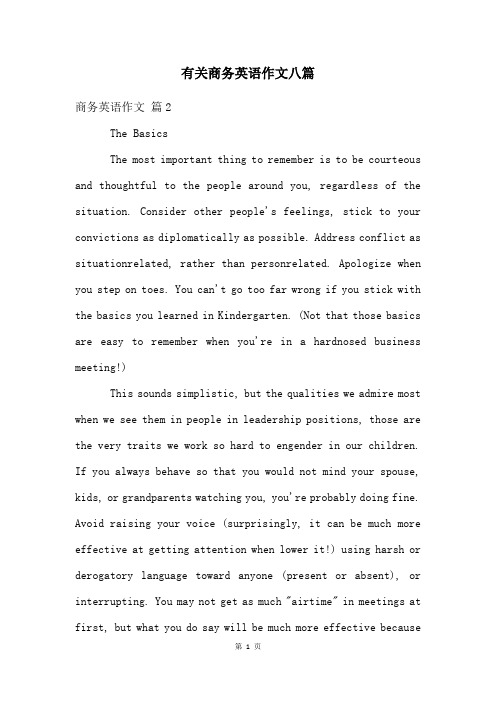
有关商务英语作文八篇商务英语作文篇2The BasicsThe most important thing to remember is to be courteous and thoughtful to the people around you, regardless of the situation. Consider other people's feelings, stick to your convictions as diplomatically as possible. Address conflict as situationrelated, rather than personrelated. Apologize when you step on toes. You can't go too far wrong if you stick with the basics you learned in Kindergarten. (Not that those basics are easy to remember when you're in a hardnosed business meeting!)This sounds simplistic, but the qualities we admire most when we see them in people in leadership positions, those are the very traits we work so hard to engender in our children. If you always behave so that you would not mind your spouse, kids, or grandparents watching you, you're probably doing fine. Avoid raising your voice (surprisingly, it can be much more effective at getting attention when lower it!) using harsh or derogatory language toward anyone (present or absent), or interrupting. You may not get as much "airtime" in meetings at first, but what you do say will be much more effective becauseit carries the weight of credibility and respectability.The following are guidelines and tips that we've found helpful for dealing with people in general, in work environments, and in social situations.It's About PeopleTalk and visit with people. Don't differentiate by position or standing within the company. Secretaries and janitorial staff actually have tremendous power to help or hinder your career. Next time you need a document prepared or a conference room arranged for a presentation, watch how many people are involved with that process (you'll probably be surprised!) and make it a point to meet them and show your appreciation.Make it a point to arrive ten or fifteen minutes early and visit with people that work near you. When you're visiting another site, linger over a cup of coffee and introduce yourself to people nearby. If you arrive early for a meeting, introduce yourself to the other participants. At social occasions, use the circumstances of the event itself as an icebreaker. After introducing yourself, ask how they know the host or how they like the crab dip. Talk a little about yourself your hobbies, kids, or pets; just enough to get people to open up about theirsand get to know you as a person.Keep notes on people. There are several "contact management" software applications that are designed for salespeople, but in business, nearly everyone is a salesperson in some capacity or another. They help you create a "people database" with names, addresses, phone numbers, birthdays, spouse and children's' names; whatever depth of information is appropriate for your situation.It's a good idea to remember what you can about people; and to be thoughtful. Send cards or letters for birthdays or congratulations of promotions or other events, send flowers for engagements, weddings or in condolence for the death of a loved one or family member. People will remember your kindness, probably much longer than you will!商务英语作文篇3The SolutionMost behavior that is perceived as disrespectful, discourteous or abrasive is unintentional, and could have been avoided by practicing good manners or etiquette. We've always found that most negative experiences with someone were unintentional and easily repaired by keeping an open mind and maintaining open, honest communication. Basic knowledge andpractice of etiquette is a valuable advantage, because in a lot of situations, a second chance may not be possible or practical. There are many written and unwritten rules and guidelines for etiquette, and it certainly behooves a business person to learn them. The caveat is that there is no possible way to know all of them!These guidelines have some difficulttonavigate nuances, depending on the company, the local culture, and the requirements of the situation. Possibilities to commit a faux pas are limitless, and chances are, sooner or later, you'll make a mistake. But you can minimize them, recover quickly, and avoid causing a bad impression by being generally considerate and attentive to the concerns of others, and by adhering to the basic rules of etiquette. When in doubt, stick to the basics. 商务英语作文篇4正式介绍信是写信人因公务把自己的同事或业务关系介绍给某单位或某个人。
2023年高级商务英语考试(BEC)写作范文精选5篇整理

2023年高级商务英语考试(BEC)写作范文精选5篇整理为了让大家能够提高bec高级的写作分数,我在这里带来了2023年高级(商务英语)考试(BEC)写作(范文)精选5篇。
2023年高级商务英语考试(BEC)写作范文(一)Report writing Ex 4: Sample answer: (235words)Reassessment of job satisfaction: Sue Pearson(PR Dept.)IntroductionThis report sets out to use Workset colours to assess the accuracy of my job description as PR officer and to suggest a number of changes.FindingsIt is clear that there is a difference between the way the company views the job and the reality as I perceive it. Firstly, a number of areas which demand a significant proportion of my time are not mentioned in the official job brief. The segment on the pie chart which provides most cause for concern is the pink sector; this relates to my attendance at a number of meetings which I can contribute little. Another significant area is the grey segment; this refers to the unscheduled time I spend sorting out computer problems. I feel these activities are hampering my core work. As can be seen from the pie charts, the time I spend actively working to meet the goals agreed with my line manager is less than envisaged.ConclusionsThe above discrepancies clearly indicate that my current job brief is inaccurate.RecommendationsI would recommend that my official job brief should be updated using the Workset colours. It would also be valuable to consider the proportion of non-core colours in the pie chart and to investigate whether work in these areas could be carried out by someone else more suited to these tasks.2023年高级商务英语考试(BEC)写作范文(二)Flexible working Ex 5:Sample answer: (250words)Resource Planning Manager: Assessment of Suitability forHome-based WorkingIntroductionThe purpose of this report is to assess the suitability of my position as Resource Planning Manager for home-based working.FindingsMy working pattern and that of my colleagues varies from week toweek. During certain periods a large proportion of my time is spent doing fieldwork. This is followed by office-based collating and recording the data collected. Once the results have been recorded, I proof-read the colour copies of all reports and maps.As regards communication with colleagues, department meetings are held once a fortnight. At other times, the individual members of the team communicate either face-to-face or by phone, depending on their location. Apart from official meetings, the same results can be achieved whether I am in the office or working elsewhere.ConclusionIt is clearly that I could be able to undertake the duties while working from home for a large proportion of my time. Clearly, some days would be spent in the office for face-to-face communication with colleagues. It would also be necessary to use the technical facilities at times. However, in order to be able to work effectively from home, I would need to be provided with a networked computer and printer.RecommendationsI would suggest that I should be given the necessary equipment to work partially from home for a trial period. After this time, further consultation should take place in order to reassess the situation.2023年高级商务英语考试(BEC)写作范文(三)Business practices in China Ex 3: Sample answer: (244words)Dear Chen,I was very pleased to receive your letter. As requested, I enclose some advice about visiting Milan.There are lots of good hotels near the Fiera and I recommend the Hotel Wagner; it is about a ten-minute walk from the trade fair and also has the metro and train connections. The public transport system here is quite reliable and I do not think you need to hire a car; the traffic in Milan can be a bit chaotic.Finding somewhere to eat in the evening should be easy. There are plenty of restaurants and pizzerias near the hotel. My favourite is Nove Cento, which serves excellent seafood pasta.It is difficult to know what to recommend for sightseeing as the city has so much to offer. If you are interested in art, then the world famous ‘Last Supper by Leonardo da Vinci is a short train ride from the hotel or you could visit the Brera art gallery. There is also the Duomo, Milans huge gothic cathedral. If you are interested in football, there should be midweek match featuring either AC or Inter Milan. Alternatively, you could visit the fashion area around via Montenapoleone.Thank you for inviting me for a meal one evening during you stay. I would be very happy to accept.I look forward to hearing from you nearer the time. We can then make the arrangements for where and when we are going to meet.Best regardsMaurizio2023年高级商务英语考试(BEC)写作范文(四)Suggested answer: (127words)The last years of twentieth century saw the Internet being used by more and more companies as a business tool. In 1997 e-commerce was very limited earning a revenue of less than $25 billion. However, since then, there has been a steady growth worldwide. This trend looks set to continue into the next century with revenue from e-commerce rising to reach almost $200 billion by 2023.Like e-commerce, e-business has shown steady growth with revenue tripling in the period 1997 to 2000, rising from about $50 billion to $150 billion. However, during there is predicted to be a far more dramatic increase in e-business revenue over the next three years. It is thought that by 2023 revenue from e-business will have reached over $800 billion worldwide.2023年高级商务英语考试(BEC)写作范文(五)A motivation surveyEx 3: Sample answer: (116words)FindingsA number of employees clearly suffer from a lack of motivation as a result of dissatisfaction in one or more areas of their work. The key findings are outlined below:Staff feel undervalued by the company, both on a financial and a personal level. It is generally felt that the companyˇs competitors offer higher levels of remuneration. The perception that the managers are unappreciative of staff efforts is particularly noticeable in the Sales Department.Certain employees feel under-challenged. The company is clearly not exploiting its human resources.There appears to be a breakdown of communication in the Production Department. The confusion and resultant ill-feeling towards managers has the potential to disrupt the production cycles.RecommendationsWe strongly recommend the following measures:An evaluation of job profiles throughout the company to assess whether skills could be utilised more efficientlyA review of the current salary structure involving the comparison with similar organisationsIt is also essential to investigate and take action regarding the communication in the Production and Sales Department.2023年高级商务英语考试(BEC)写作范文精选5篇文档内容到此结束,欢迎大家下载、修改、丰富并分享给更多有需要的人。
商务英语作文汇编8篇
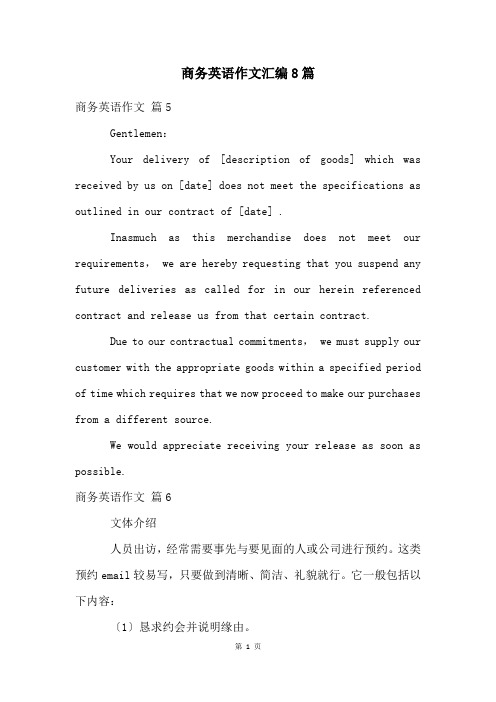
商务英语作文汇编8篇商务英语作文篇5Gentlemen:Your delivery of [description of goods] which was received by us on [date] does not meet the specifications as outlined in our contract of [date] .Inasmuch as this merchandise does not meet our requirements, we are hereby requesting that you suspend any future deliveries as called for in our herein referenced contract and release us from that certain contract.Due to our contractual commitments, we must supply our customer with the appropriate goods within a specified period of time which requires that we now proceed to make our purchases from a different source.We would appreciate receiving your release as soon as possible.商务英语作文篇6文体介绍人员出访,经常需要事先与要见面的人或公司进行预约。
这类预约email较易写,只要做到清晰、简洁、礼貌就行。
它一般包括以下内容:〔1〕恳求约会并说明缘由。
〔2〕建议准确的约会时间和地点等。
假如你的时间比较充裕,预约时可给出你可接受的'时间由对方确定。
〔3〕请对方答复并进行确认。
商务英语写作范文(汇总7篇)
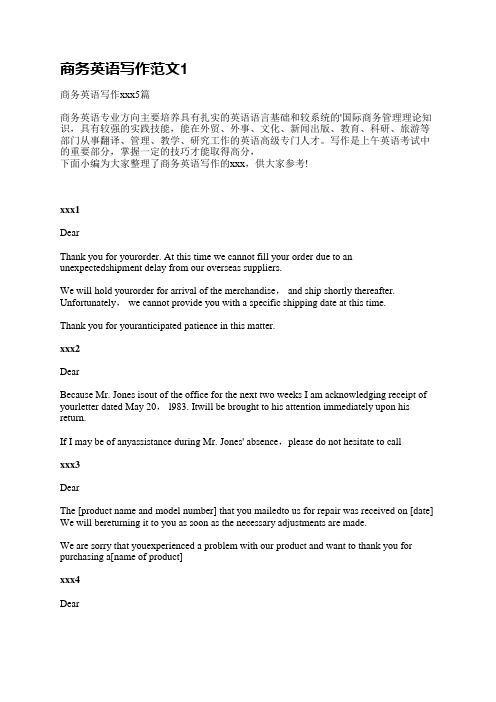
商务英语写作范文1商务英语写作xxx5篇商务英语专业方向主要培养具有扎实的英语语言基础和较系统的'国际商务管理理论知识,具有较强的实践技能,能在外贸、外事、文化、新闻出版、教育、科研、旅游等部门从事翻译、管理、教学、研究工作的英语高级专门人才。
写作是上午英语考试中的重要部分,掌握一定的技巧才能取得高分,下面小编为大家整理了商务英语写作的xxx,供大家参考!xxx1DearThank you for yourorder. At this time we cannot fill your order due to an unexpectedshipment delay from our overseas suppliers.We will hold yourorder for arrival of the merchandise, and ship shortly thereafter. Unfortunately, we cannot provide you with a specific shipping date at this time.Thank you for youranticipated patience in this matter.xxx2DearBecause Mr. Jones isout of the office for the next two weeks I am acknowledging receipt of yourletter dated May 20, l983. Itwill be brought to his attention immediately upon his return.If I may be of anyassistance during Mr. Jones' absence,please do not hesitate to callxxx3DearThe [product name and model number] that you mailedto us for repair was received on [date] We will bereturning it to you as soon as the necessary adjustments are made.We are sorry that youexperienced a problem with our product and want to thank you for purchasing a[name of product]xxx4DearThis is to inform youthat we have carefully reviewed your estimate on the parking lotrefurbishing. We are planning to contract with you for this work.We are unable to letthis contract immediately, as finalapproval of expenditures of this nature must come from the head office in NewYork.DearWe have received yourletter acknowledging receipt of the items we mailed to you and noticing us tocancel shipment of your order for those items which are back ordered.We will be issuing youa refund as soon as we have completed the necessary paperwork for your account.We would like to takethis opportunity to thank you for shopping through [name] Our new [specify] catalogshould be arriving at your home shortly, and I believe you will be pleased by some of the beautiful choicesour buyers have made this season.Thank you for yourpatience and understanding and for providing us with the opportunity to be ofservice to you.xxx5DearThank you for yourkind letter regarding your exceptional treatment by one of our employees.A copy of your letter has been forwarded to the personnel department and willbe included in the employee's file.So seldom is it that acustomer takes the time to write a letter of appreciation, that I feel moved to reward your initiative.Please accept theenclosed certificate, which, when presented, will entitlethe bearer to a ten percent discount on the merchandise being purchased at thattime.This is but a smalltoken of our appreciation of customers such as you, upon whose satisfaction we have been allowed to grow and prosper inthis highly competitive marketplace. Again, on behalf of our entire organization, a heart-felt thank you.商务英语写作范文2商务英语写作xxx英语写作在商务英语考试中是必不可少的,要特别注意格式,下面是小编整理出来的x xx,供大家参考!xxx一:The headhunting process (234words)Dear Mr JacobsI am writing to apply to the position of Sales Adviser for the North East Region which was advertised in Herald International yesterday.Although I am currently working in the Marketing Department of a large multinational, I would appreciate to work for a rapidly expanding young company such as yours.As you can see from my enclosed CV, I obtained an honours degree in Sales and Marketing from Nottingham University in 1994. I thoroughly enjoyed the six months I spent in working in Boots plc as pert of the course. During this time I gained invaluable insights into the nature of sales. After leaving university I initially spent time working for a small local firm before finding my current job and I feel that I am more suited to the dynamics and varied demands of a smaller firm.Not only has my experience familiarised me with the challenges faced by the industry today but, having been brought up in the north east, I know the region, its problems and its undoubted potential. As a result, I feel that I would be able to relate to your customers on both a professional and a personal level.I am available for interview from 15 September and would be pleased to discuss my CV in more detail then,I look forward to hearing from you.Yours sincerelyXXXxxx二:Report writing (235words)Reassessment of job satisfaction: Sue Pearson(PR Dept.)IntroductionThis report sets out to use Workset colours to assess the accuracy of my job description as PR officer and to suggest a number of changes.FindingsIt is clear that there is a difference between the way the company views the job and the reality as I perceive it. Firstly, a number of areas which demand a significant proportion of my time are not mentioned in the official job brief. The segment on the pie chart which provides most cause for concern is the pink sector; this relates to my attendance at a number of meetings which I can contribute little. Another significant area is the grey segment; this refers to the unscheduled time I spend sorting out computer problems. I feel these activities are hampering my core work. As can be seen from the pie charts, the time I spend actively working to meet the goals agreed with my line manager is less than envisaged.ConclusionsThe above discrepancies clearly indicate that my current job brief is inaccurate. RecommendationsI would recommend that my official job brief should be updated using the Workset colours. It would also be valuable to consider the proportion of non-core colours in the pie chart and to investigate whether work in these areas could be carried out by someone else more suited to these tasks.商务英语写作范文32017年商务英语写作xxx商务英语写作是一种商务沟通手段,但是又与传统意义的.写作有着显著的差异。
商务英语作文600字四篇

商务英语作文600字四篇商务英语作文600字篇1Describing graphs Ex 4: Sample answer: (132words)The share price of IBM and AOL showed a upward trend from June until the end of 1998.However, while AOL shares then continued to rise steadily over the next three months, the price of IBM shares fell slightly. By March 1999 both shares were worth about $100.AOL shares then shot up, almost doubling in value within four weeks. They reached a high of $180 in mid-April before collapsing to just over $100 per share at the beginning of May. There was a slight recovery during that month however, despite this by June 1999 the price of AOL shares was once again about $100. In contrast, despite minor fluctuations, IBM shares made a steady recovery over the three month period, finishing at just over $100, almost equal to AOL.商务英语作文600字篇2你是一家国际大公司的人力资源部经理。
商务英语作文精彩6篇
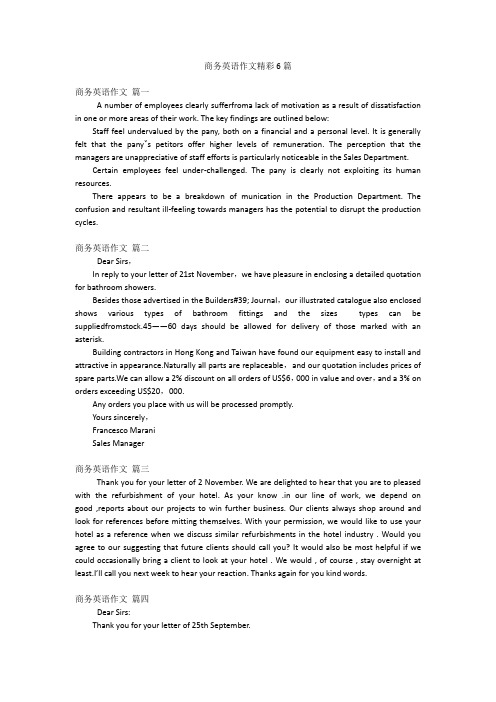
商务英语作文精彩6篇商务英语作文篇一A number of employees clearly sufferfroma lack of motivation as a result of dissatisfaction in one or more areas of their work. The key findings are outlined below:Staff feel undervalued by the pany, both on a financial and a personal level. It is generally felt that the panyˇs petitors offer higher levels of remuneration. The perception that the managers are unappreciative of staff efforts is particularly noticeable in the Sales Department.Certain employees feel under-challenged. The pany is clearly not exploiting its human resources.There appears to be a breakdown of munication in the Production Department. The confusion and resultant ill-feeling towards managers has the potential to disrupt the production cycles.商务英语作文篇二Dear Sirs,In reply to your letter of 21st November,we have pleasure in enclosing a detailed quotation for bathroom showers.Besides those advertised in the Builders#39; Journal,our illustrated catalogue also enclosed shows various types of bathroom fittings and the sizes types can be suppliedfromstock.45——60 days should be allowed for delivery of those marked with an asterisk.Building contractors in Hong Kong and Taiwan have found our equipment easy to install and attractive in appearance.Naturally all parts are replaceable,and our quotation includes prices of spare parts.We can allow a 2% discount on all orders of US$6,000 in value and over,and a 3% on orders exceeding US$20,000.Any orders you place with us will be processed promptly.Yours sincerely,Francesco MaraniSales Manager商务英语作文篇三Thank you for your letter of 2 November. We are delighted to hear that you are to pleased with the refurbishment of your hotel. As your know .in our line of work, we depend on good ,reports about our projects to win further business. Our clients always shop around and look for references before mitting themselves. With your permission, we would like to use your hotel as a reference when we discuss similar refurbishments in the hotel industry . Would you agree to our suggesting that future clients should call you? It would also be most helpful if we could occasionally bring a client to look at your hotel . We would , of course , stay overnight at least.I’ll call you next week to hear your reaction. Thanks again for you kind words.商务英语作文篇四Dear Sirs:Thank you for your letter of 25th September.As one of the largest dealers of garments, we are interested in ladies? dresses of all descriptions. We would be grateful if you would give us quotations per dozen of C.I.F. Vancouver for those items as listed on the separate sheet. In the meantime, we would like you to sendus samples of the various materials of which the dresses are made.We are given to understand that you are a state-owned enterprise and we have confidence in the quality of Chinese products. If your prices are moderate, we believe there is a promising market for the above-mentioned articles in our area.We look forward to hearingfromyou soon.Yours faithfully,Canadian Garment Co.Ltd.商务英语作文篇五Dear sirs:I am writing to apply for the position of XXXX.To briefly introduce myself, I am a graduate student of XXXXX majoring in XXXX and elect XXXX course, will graduation XXXX.My interactive personal skills and teamwork spirit are appropriate for this position; please refer to my attached resume.I would be grateful if you could arrange an interview at your earliest convenience. Thank you for you time.Yours sincerelyXXX商务英语作文篇六Dear Mr ZampieriWith reference to your letter dated 14 June, in which you requested information about A Cut Above, please find enclosed details about our pany and the services we offer.Our aim is always to provide our clients with the best possible bination of food, entertainment and location. By choosing A cut Above, you can relax and enjoy your special occasion while we do all the work. Events catered for by A cut Above include corporate functions such as conventions and Christmas balls and also family celebrations such as birthdays, weddings and anniversaries.A Cut Above offers a variety of services from simply providing a gourmet menu to helping you choose the right venue and organise entertainment. We specialise in using our experience to meet your nees. To help us achieve this aim, we always arrange a meeting with a new client well before the date of any event in order to discuss the various possibilities.As you can appreciate, we are unable to give quotations before our initial briefing with a client as price per head vaires with choice of menu.To arrange a meeting or for any further information, please do not hesitate to contact myself or Elena Polidoro on 0123 4578.A Cut Above look forward to hearing from you.Yours sincerelySinead Walsh。
BEC商务英语初级写作精选范文3篇
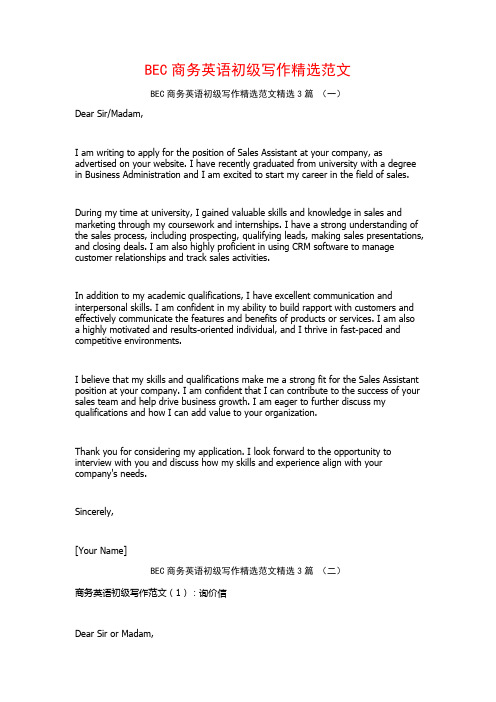
BEC商务英语初级写作精选范文BEC商务英语初级写作精选范文精选3篇(一)Dear Sir/Madam,I am writing to apply for the position of Sales Assistant at your company, as advertised on your website. I have recently graduated from university with a degree in Business Administration and I am excited to start my career in the field of sales.During my time at university, I gained valuable skills and knowledge in sales and marketing through my coursework and internships. I have a strong understanding of the sales process, including prospecting, qualifying leads, making sales presentations, and closing deals. I am also highly proficient in using CRM software to manage customer relationships and track sales activities.In addition to my academic qualifications, I have excellent communication and interpersonal skills. I am confident in my ability to build rapport with customers and effectively communicate the features and benefits of products or services. I am also a highly motivated and results-oriented individual, and I thrive in fast-paced and competitive environments.I believe that my skills and qualifications make me a strong fit for the Sales Assistant position at your company. I am confident that I can contribute to the success of your sales team and help drive business growth. I am eager to further discuss my qualifications and how I can add value to your organization.Thank you for considering my application. I look forward to the opportunity to interview with you and discuss how my skills and experience align with your company's needs.Sincerely,[Your Name]BEC商务英语初级写作精选范文精选3篇(二)商务英语初级写作范文(1):询价信Dear Sir or Madam,I am writing to inquire about the prices and availability of the products your company offers.I have recently started a small online business and I am interested in purchasing a range of office supplies, including pens, notebooks, and staplers. I would like to know if you have these items in stock and what the current prices are.Could you also provide information on any discounts or deals that may be available for bulk orders? I am looking to purchase a large quantity of these items on a regular basis, so any cost savings would be greatly appreciated.In addition, please let me know what the payment methods are and if there are any additional charges for shipping. I am located in XYZ city and would like to know if you offer delivery to this area.I would be grateful if you could send me a detailed price list along with any necessary order forms or catalogs. This will allow me to assess whether your products meet my requirements and make an informed decision about purchasing from your company.Thank you for your attention to this matter. I look forward to hearing from you soon with the requested information.Yours faithfully,[Your Name][Your Company Name][Contact Information]商务英语初级写作范文(2):感谢信Dear Mr. Johnson,I am writing to express my sincere gratitude for the wonderful service I received during my recent visit to your hotel.From the moment I arrived, the staff at your hotel went above and beyond to ensure that my stay was comfortable and enjoyable. The receptionist was warm and welcoming, and the concierge was incredibly helpful in providing recommendations for local attractions and restaurants.The housekeeping staff did an excellent job of keeping my room clean and well-stocked, and the restaurant staff provided prompt and attentive service during breakfast and dinner.I was particularly impressed with the level of professionalism displayed by your staff. They were always courteous and willing to assist with any request I had. It is clear that you have a well-trained and dedicated team working at your establishment.I would like to commend your hotel for its high standards of service and hospitality. It was truly a pleasure to stay at your establishment, and I will definitely recommend it to friends and colleagues who plan on visiting the area.Once again, thank you for providing such a positive experience. I look forward to staying at your hotel again in the future.Yours sincerely,[Your Name][Your Company Name][Contact Information]商务英语初级写作范文(3):申请信Dear Hiring Manager,I am writing to apply for the position of Marketing Assistant advertised on your company's website.I recently graduated with a Bachelor's degree in Business Administration, with a focus on Marketing. During my time at university, I completed internships at twodifferent marketing agencies, where I gained practical experience in market research, campaign development, and social media management.I am particularly interested in working for your company because of its strong reputation in the industry and its commitment to innovation. I believe that my creativity and attention to detail would make me an asset to your marketing team.In addition to my academic and professional experience, I am also proficient in a range of marketing software, including Adobe Creative Cloud and Google Analytics. I am a fast learner and have the ability to quickly adapt to new technologies and tools.I am confident that my skills and qualifications make me a strong candidate for this position. I would welcome the opportunity to discuss how my experience aligns with your company's needs in more detail.Thank you for considering my application. I look forward to the possibility of working with you in the future.Yours sincerely,[Your Name][Contact Information]BEC商务英语初级写作精选范文精选3篇(三)A Letter of RecommendationFebruary 15, 2022To Whom It May Concern,Re: Recommendation for Ms. Emily ThompsonI am writing to highly recommend Ms. Emily Thompson for any position or opportunity she may seek. I have had the pleasure of working closely with Emily for the past two years, and her dedication, professionalism, and strong work ethic have truly impressed me.Emily joined our company as a marketing assistant, and from the start, she demonstrated exceptional skills and qualities that set her apart from her peers. She has a keen understanding of marketing strategies and is always up-to-date with the latest industry trends. Her ability to analyze market data and identify key insights has greatly contributed to the success of our marketing campaigns.What truly sets Emily apart is her creativity and attention to detail. She has consistently delivered innovative and engaging content for our social media platforms and website. Her writing skills are exceptional, and she has a talent for capturing the attention of our target audience. In addition, she has successfully managed several high-profile projects, consistently meeting deadlines and exceeding expectations.Emily is not only a talented professional but also a great team player. She is always willing to lend a helping hand and collaborate with others to achieve common goals. Her positive attitude and strong communication skills have helped foster a productive and harmonious work environment.Throughout my time working with Emily, I have been consistently impressed by her ability to handle challenging situations with grace and composure. She is a quick thinker and is able to adapt to changing circumstances effortlessly. Her problem-solving skills are top-notch, and she always approaches obstacles with a proactive attitude.In summary, I wholeheartedly recommend Emily Thompson for any position or opportunity she may seek. She is a highly skilled and dedicated individual, and her contribution to our company has been invaluable. I am confident that she will bring the same level of professionalism and success to any endeavor she undertakes.Please do not hesitate to contact me if you require any further information or clarification regarding Emily's qualifications and abilities.Yours sincerely,John DavisMarketing Manager。
BEC商务英语考试写作5篇
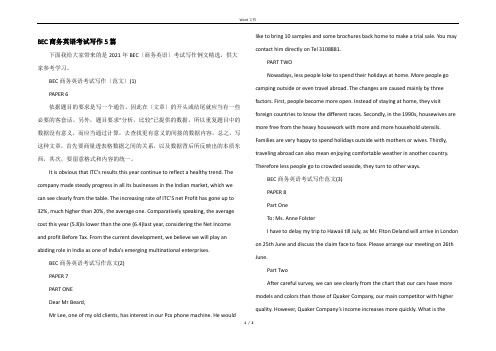
BEC商务英语考试写作5篇下面我给大家带来的是2021年BEC〔商务英语〕考试写作例文精选,供大家参考学习。
BEC商务英语考试写作〔范文〕(1)PAPER 6依据题目的要求是写一个通告。
因此在〔文章〕的开头或结尾就应当有一些必要的客套话。
另外,题目要求“分析,比较”已提供的数据,所以重复题目中的数据没有意义,而应当通过计算,去查找更有意义的间接的数据内容。
总之,写这种文章,首先要商量透表格数据之间的关系,以及数据背后所反映出的本质东西,其次,要留意格式和内容的统一。
It is obvious that ITC’s results this year continue to reflect a healthy trend. The company made steady progress in all its businesses in the Indian market, which we can see clearly from the table. The increasing rate of ITC’S net Profit has gone up to 32%, much higher than 20%, the average one. Comparatively speaking, the average cost this year (5.8)is lower than the one (6.4)last year, considering the Net Income and profit Before Tax. From the current development, we believe we will play an abiding role in India as one of India’s emerging multinational enterprises.BEC商务英语考试写作范文(2)PAPER 7PART ONEDear Mr Beard,Mr Lee, one of my old clients, has interest in our Pcx phone machine. He would like to bring 10 samples and some brochures back home to make a trial sale. You may contact him directly on Tel 3108881.PART TWONowadays, less people loke to spend their holidays at home. More people go camping outside or even travel abroad. The changes are caused mainly by three factors. First, people become more open. Instead of staying at home, they visit foreign countries to know the different races. Secondly, in the 1990s, housewives are more free from the heavy housework with more and more household utensils. Families are very happy to spend holidays outside with mothers or wives. Thirdly, traveling abroad can also mean enjoying comfortable weather in another country. Therefore less people go to crowded seaside, they turn to other ways.BEC商务英语考试写作范文(3)PAPER 8Part OneTo: Ms. Anne FolsterI have to delay my trip to Hawaii till July, as Mr. Flton Deland will arrive in London on 25th June and discuss the claim face to face. Please arrange our meeting on 26th June.Part TwoAfter careful survey, we can see clearly from the chart that our cars have more models and colors than those of Quaker Company, our main competitor with higher quality. However, Quaker Company’s income increases more quickly. What is thereason? First, Quaker Company spends much more money in advertising. I suggest we advertise on BTV, the most popular broadcasting station nowadays,. Secondly, we should enlarge the scope of our after----sales service. We can open more service stations in many medium----sized cities. Thirdly, if we have more money, we can hire more salesmen to sell cars directly to the customers, especially, more salesman in medium-sized cities.BEC商务英语考试写作范文(4)PAPER 9PART ONE:Dear Mr. Simon:A customer complained that he had received 100 green colored bicycles instead of 50 green and 50 blue color bicycles, which had been shipped on 11th May. Could you please send me the invoice under contract No.TX12----1 in duplicate?PART TWO:Both Betty Fashion Shop and ours are in city center, therefore, we have almost the same customers. But there exists a fact that customers are more likely to spend their money in Betty shop. After careful research, we notice that, although Betty shop has higher prices, they also have more fashionable clothes. Compared with Betty Shop, our real prices are not high, but the comparative prices to fashion are high. Therefore, if our shop decides to increase the profits, we should purchase highly fashionable clothes, at least as fashionable as Betty Shop, with the prices lower than Betty Shop’s. As customers hate increasing prices, it is better to do this gradually.BEC商务英语考试写作范文(5)PAPER 10PART ONE:To: EmilyAs no one in the office has been to Italy, it will be a good idea to visit it. We may stay in the Grand Palazzo Hotel and the telephone is 809.775.3333. Please contact them to get further information.PART TWO:How to improve Quality Management System with limited capitals? That is the key to success. After careful study of IBI Inc, our main competitor, we find that they spend some money in Customer Service and Vender Inspections, which are vital to Quality Management. As we know softwares are developed quickly. Customers and venders know what they need. Therefore, we should develop programs based on information through IBI Inc.’s Plant’ Productivity is not high, they can sell out their new, high-quality softwares quickly as they have a very good Quality Control System. Therefore, we should adjust the capitals.BEC商务英语考试写作范文5篇。
【精品】商务英语作文4篇
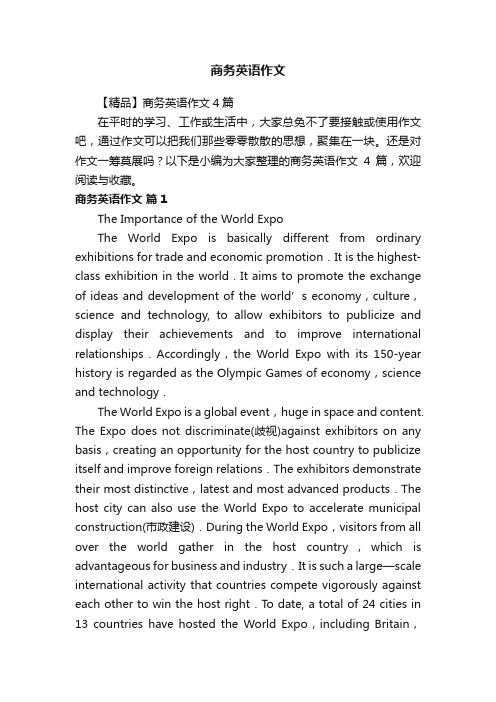
商务英语作文【精品】商务英语作文4篇在平时的学习、工作或生活中,大家总免不了要接触或使用作文吧,通过作文可以把我们那些零零散散的思想,聚集在一块。
还是对作文一筹莫展吗?以下是小编为大家整理的商务英语作文4篇,欢迎阅读与收藏。
商务英语作文篇1The Importance of the World ExpoThe World Expo is basically different from ordinary exhibitions for trade and economic promotion.It is the highest-class exhibition in the world.It aims to promote the exchange of ideas and development of the world’s economy,culture,science and technology, to allow exhibitors to publicize and display their achievements and to improve international relationships.Accordingly,the World Expo with its 150-year history is regarded as the Olympic Games of economy,science and technology.The World Expo is a global event,huge in space and content. The Expo does not discriminate(歧视)against exhibitors on any basis,creating an opportunity for the host country to publicize itself and improve foreign relations.The exhibitors demonstrate their most distinctive,latest and most advanced products.The host city can also use the World Expo to accelerate municipal construction(市政建设).During the World Expo,visitors from all over the world gather in the host country,which is advantageous for business and industry.It is such a large—scale international activity that countries compete vigorously against each other to win the host right.T o date, a total of 24 cities in 13 countries have hosted the World Expo,including Britain,France,America,Germany,Belgium,Canada,Japan,Australia,Spain,Italy,Korea,Portugal and China.世博会的重要意义世博会与那些为促进贸易和经济发展的普通会展有着根本的区别。
商务英语作文10篇
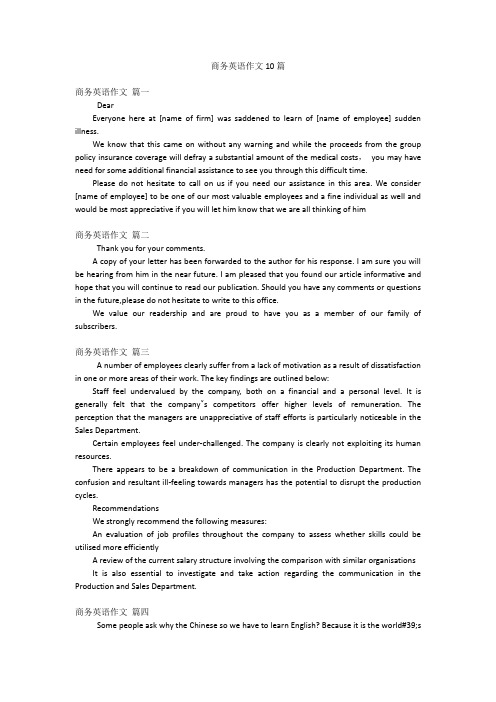
商务英语作文10篇商务英语作文篇一DearEveryone here at [name of firm] was saddened to learn of [name of employee] sudden illness.We know that this came on without any warning and while the proceeds from the group policy insurance coverage will defray a substantial amount of the medical costs,you may have need for some additional financial assistance to see you through this difficult time.Please do not hesitate to call on us if you need our assistance in this area. We consider [name of employee] to be one of our most valuable employees and a fine individual as well and would be most appreciative if you will let him know that we are all thinking of him商务英语作文篇二Thank you for your comments.A copy of your letter has been forwarded to the author for his response. I am sure you will be hearing from him in the near future. I am pleased that you found our article informative and hope that you will continue to read our publication. Should you have any comments or questions in the future,please do not hesitate to write to this office.We value our readership and are proud to have you as a member of our family of subscribers.商务英语作文篇三A number of employees clearly suffer from a lack of motivation as a result of dissatisfaction in one or more areas of their work. The key findings are outlined below:Staff feel undervalued by the company, both on a financial and a personal level. It is generally felt that the companyˇs competitors offer higher levels of remuneration. The perception that the managers are unappreciative of staff efforts is particularly noticeable in the Sales Department.Certain employees feel under-challenged. The company is clearly not exploiting its human resources.There appears to be a breakdown of communication in the Production Department. The confusion and resultant ill-feeling towards managers has the potential to disrupt the production cycles.RecommendationsWe strongly recommend the following measures:An evaluation of job profiles throughout the company to assess whether skills could be utilised more efficientlyA review of the current salary structure involving the comparison with similar organisationsIt is also essential to investigate and take action regarding the communication in the Production and Sales Department.商务英语作文篇四Some people ask why the Chinese so we have to learn English? Because it is the world#39;smost important languages. English was used in different countries, inter-business transactions, and three-quarters of the world#39;s newspapers and books are written in English. If you know English, you will be able to enjoy more books. English is the knowledge leading to a bridge.Therefore, we must do more listening, speaking, reading and writing aspects of the practice. If you learn English more efforts to learn English is not difficult.商务英语作文篇五文体介绍人员出访,常常需要事先与要见面的人或公司进行预约。
精选商务英语作文3篇
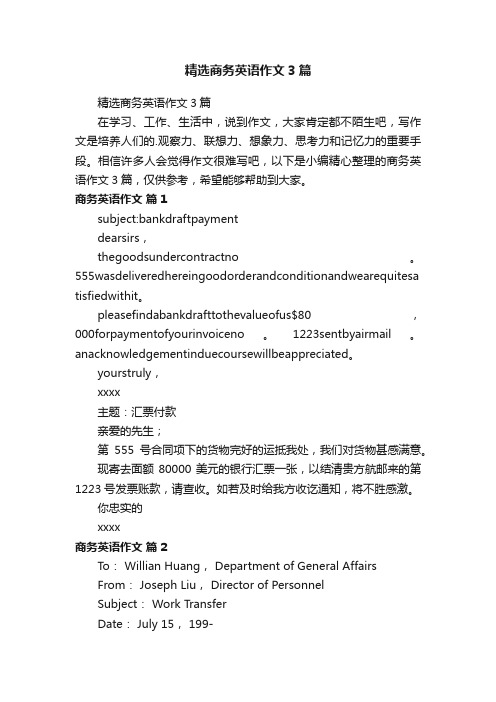
精选商务英语作文3篇精选商务英语作文3篇在学习、工作、生活中,说到作文,大家肯定都不陌生吧,写作文是培养人们的.观察力、联想力、想象力、思考力和记忆力的重要手段。
相信许多人会觉得作文很难写吧,以下是小编精心整理的商务英语作文3篇,仅供参考,希望能够帮助到大家。
商务英语作文篇1subject:bankdraftpaymentdearsirs,thegoodsundercontractno。
555wasdeliveredhereingoodorderandconditionandwearequitesa tisfiedwithit。
pleasefindabankdrafttothevalueofus$80,000forpaymentofyourinvoiceno。
1223sentbyairmail。
anacknowledgementinduecoursewillbeappreciated。
yourstruly,xxxx主题:汇票付款亲爱的先生;第555号合同项下的货物完好的运抵我处,我们对货物甚感满意。
现寄去面额80000美元的银行汇票一张,以结清贵方航邮来的第1223号发票账款,请查收。
如若及时给我方收讫通知,将不胜感激。
你忠实的xxxx商务英语作文篇2To: Willian Huang, Department of General AffairsFrom: Joseph Liu, Director of PersonnelSubject: Work TransferDate: July 15, 199-I think, Mr. Huang, the Director of your Department has already talked to you about the change in your work. We have arranged to appoint you as section supervisor in the Security Department at a salary of US$** a month (20% increase) as from Tuesday, August 1, 199-. In your new post, you will be responsible to Mr. Francis Yang for the work of night shift employees in the department.Your eight years of loyal service in the General Affairs Department have been appreciated by the leadership of the company. Your transfer is completely due to the need of company. You have known that many thefts have recently taken place that have caused heavy losses to our company. We trust that with your appointment to this post, the security work will be greatly strengthened.Please write to confirm that you will accept this appointment. 商务英语作文篇3Our country is known as “nation of the etiquette” the laudatory name, the advocation etiquette is our country people's traditional moral excellence.From ancient times till now, our country's etiquette standard is the Chinese unique civilization symbol, is Chinese nation moral excellence manifesting.The etiquette, took one traditional moral excellence, has the historical inheritance, has vitality which does not fade.The etiquette involves which in the commercial contact are very many, but from basic speaks between the human and human's contact, therefore we are used to the commercial etiquette limits art which associates for the commercial personnel.As the name suggests, the commercial etiquette is refers in the people commerce contact the suitable etiquette standard, isin the commercial contact, by the procedure, the way which certain, is established by usage indicated respects opposite party the process and the method.The ritual stems from vulgarly, popularizes for the ritual.The commercial etiquette operationality, how is should do, how shouldn't do.Achieves in the commercial contact “restrains oneself, respects other people” to be able to cause the people with ease happily to associate.Not only “considers for other people” is the commercial contact, also is between the human and the human the normal contact basic principle.Therefore said the study and the correct utilization commerce etiquette not only is a person intrinsic tutelage and the quality external performance, also is in the human communication the suitable one kind of art, one human relations way or the human relations method, are in the human communication are established by usage show respect, the friendly custom procedure.Carries on in the human communication communicates mutually certainly must grasp the commercial etiquette the skill.Looked from individual angle that, grasps certain commercial etiquette to be helpful in enhances people's own tutelage, beautifies own, the beautified life.And can the very effective promotion social contact, the improvement interpersonal relationship, but also is helpful to the purification social convention.Considers, a smile, a concern all can give human's by mind in warmth, and may cause own mood to be also happy along with it, why not?。
商务英语写作作文
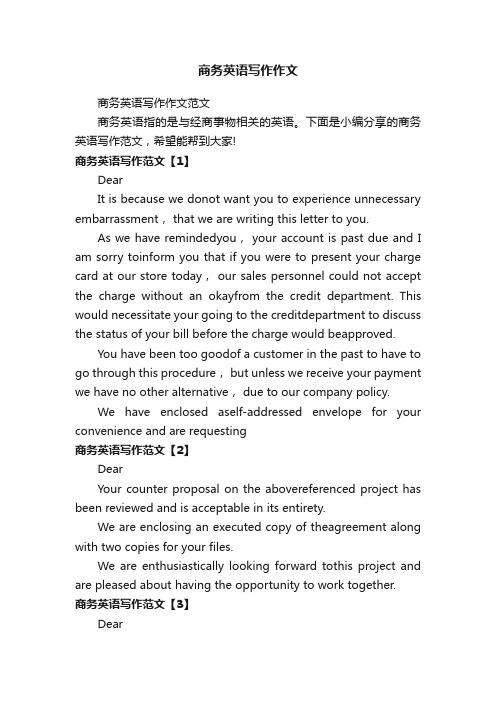
商务英语写作作文商务英语写作作文范文商务英语指的是与经商事物相关的英语。
下面是小编分享的商务英语写作范文,希望能帮到大家!商务英语写作范文【1】DearIt is because we donot want you to experience unnecessary embarrassment, that we are writing this letter to you.As we have remindedyou, your account is past due and I am sorry toinform you that if you were to present your charge card at our store today, our sales personnel could not accept the charge without an okayfrom the credit department. This would necessitate your going to the creditdepartment to discuss the status of your bill before the charge would beapproved.You have been too goodof a customer in the past to have to go through this procedure, but unless we receive your payment we have no other alternative, due to our company policy.We have enclosed aself-addressed envelope for your convenience and are requesting商务英语写作范文【2】DearYour counter proposal on the abovereferenced project has been reviewed and is acceptable in its entirety.We are enclosing an executed copy of theagreement along with two copies for your files.We are enthusiastically looking forward tothis project and are pleased about having the opportunity to work together.商务英语写作范文【3】DearI have written to youseveral times over the past three months requesting an explanation on why youhave failed to bring your account with us current.By ignoring theserequests, you are damaging theexcellent credit record you had previously maintained with our company. In addition, you are incurringadditional expense to yourself and to us.Unless I hear from youwithin ten days,I will have no otherchoice but to turn your account over for collection. I am sorry that we musttake such drastic action but I am afraid you leave us no alternative. Youcan preserve your credit rating by remitting your check today for the amountstated above.商务英语写作范文【4】GUARANTEEFOR VALUE RECEIVED, the undersigned hereby guarantee absolutely and unconditionallyprompt payment of the within Note and agree to pay all cost of collection, legal expenses and attorneys' fees,incurred or paid by the holder of the within Note in the collectionand/or enforcement of said Note and the enforcement of this Guaranty.No renewal orextension of said Note,no release orsurrender of any security for said Note or this Guaranty,no release of any person primarily or secondarily liable on saidNote (including any maker, endorser or guarantor),no delay inthe enforcement of payment of said Note or this Guaranty and no delay oromission in exercising any right or power under said Note on this Guarantyshall affect the liability of any of the undersinged hereunder. The undersignedexpressly waives presentment, protest,demand, notice of dishonor ordefault,notice of acceptanceof this Guaranty and notice of any kind withrespect to said Note or this Guarantyor the performance of the obligation under said Note or Guaranty.商务英语写作范文【5】DearThe postmark of thisletter is registered with our office. Unless you contact us at [telephone], you will run the riskof your local Sheriff serving you with a Summons and Complaint to appear inCourt without further notice to you.Filing of suit willinitiate a series of events that will cause you considerable inconvenience andexpense. In addition to the above mentioned balance, you may be liable for court costs and interest.In the event youshould fail to contact us immediately, we will assume that this debt is valid. Should you have anyreason to dispute the validity of the debt or any portion thereof,this office will obtain verification of the debt or obtain a copyof the Judgment and mail you a copy of same. This office will alsoprovide you with the name and address of the original creditor if differentfrom the current creditor.PLEASE GOVERN YOURSELFACCORDINGLY.。
商务英语作文上级给下级写信
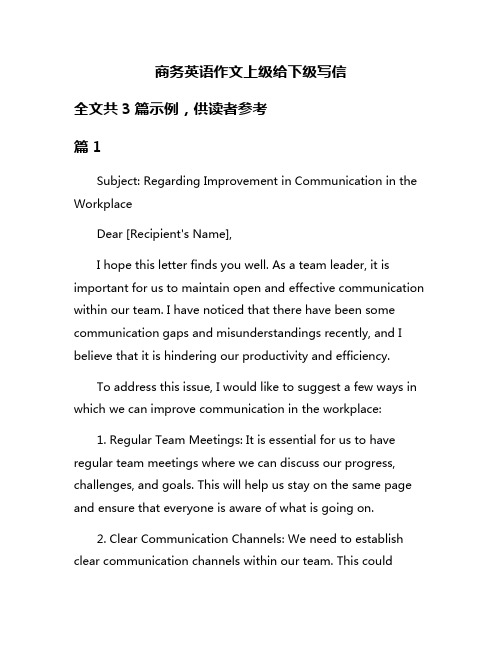
商务英语作文上级给下级写信全文共3篇示例,供读者参考篇1Subject: Regarding Improvement in Communication in the WorkplaceDear [Recipient's Name],I hope this letter finds you well. As a team leader, it is important for us to maintain open and effective communication within our team. I have noticed that there have been some communication gaps and misunderstandings recently, and I believe that it is hindering our productivity and efficiency.To address this issue, I would like to suggest a few ways in which we can improve communication in the workplace:1. Regular Team Meetings: It is essential for us to have regular team meetings where we can discuss our progress, challenges, and goals. This will help us stay on the same page and ensure that everyone is aware of what is going on.2. Clear Communication Channels: We need to establish clear communication channels within our team. This couldinclude setting up a group chat for quick updates, using project management tools for tracking progress, or simply having an open-door policy for any concerns or questions.3. Active Listening: It is important for us to listen actively to one another and make sure that everyone's voice is heard. This will help us avoid misunderstandings and make better decisions as a team.4. Feedback and Recognition: Providing feedback and recognizing each other's contributions is crucial for building a positive work environment. We should make an effort to give constructive feedback and praise when it is due.5. Team Building Activities: Lastly, I believe that team building activities can help us strengthen our communication and bond as a team. This could be anything from a simple team lunch to a more structured team-building workshop.I would like to request your support in implementing these suggestions and fostering a culture of open communication within our team. I believe that by working together and communicating effectively, we can achieve our goals and succeed as a team.Thank you for your attention to this matter. I look forward to hearing your thoughts and working together to improve communication in the workplace.Best regards,[Your Name]篇2Subject: Important Updates Regarding Company PoliciesDear Team,I hope this message finds you well. I am writing to inform you about some important updates regarding our company policies that will come into effect from next month.As we continue to grow and expand our business, it is essential for all team members to stay updated with the latest policies and procedures. These updates are designed to ensure that we operate efficiently and effectively in a fast-paced and competitive business environment.1. Attendance and Time Management:We have noticed a trend of late arrivals and extended breaks among some team members. Moving forward, it is imperative for everyone to adhere to their scheduled working hours and takebreaks as per company guidelines. Regular attendance and punctuality are crucial for maintaining a productive work environment.2. Professionalism and Communication:Effective communication is key to a successful work environment. It is important to maintain a high level of professionalism in all communications, whether it be with colleagues, clients, or external partners. Please ensure that all written correspondences are clear, concise, and free of any grammatical errors.3. Confidentiality and Data Security:As a company that deals with sensitive information, it is crucial for all team members to prioritize confidentiality and data security. Please make sure that you follow all protocols and procedures when handling confidential information to safeguard our company and client data.4. Dress Code and Grooming:Our company has a professional image to uphold, and it starts with how we present ourselves. Hence, I would like to remind everyone to adhere to the company's dress code policy and maintain a neat and professional appearance at all times.5. Training and Development:We are committed to providing ongoing training and development opportunities for our team members to enhance their skills and knowledge. If you have any suggestions or requests for specific training programs, please feel free to reach out to the HR department.I trust that these updates will help us maintain a positive and productive work environment while upholding the values and standards of our company. If you have any questions or need further clarification on any of the policies mentioned above, please do not hesitate to contact me or the HR department.Thank you for your attention and cooperation in implementing these new policies. Let us work together to strive for excellence and success in all our endeavors.Best regards,[Your Name][Your Position]篇3Subject: Business CommunicationDear Team,I hope this message finds you well. I am writing to all of you to express my gratitude for the hard work and dedication that you have shown in the past few months. I am truly impressed by the effort that each and every one of you have put into your work, and I want to take this opportunity to thank you for your commitment to our team and to our company.As we continue to navigate through these challenging times, it is important for us to work together as a team and to support each other. I am confident that we will be able to overcome any obstacles that come our way, as long as we continue to communicate openly and honestly with one another.I encourage all of you to reach out to me if you have any questions or concerns, or if you would like to discuss any ideas or suggestions that you may have. I am here to support you and to help you succeed in your roles within our team.Let us continue to work together, to communicate effectively, and to support each other as we strive to achieve our goals. I have full faith in our team and I know that we will be able to accomplish great things together.Thank you once again for your hard work and dedication. I look forward to working with all of you in the weeks and months ahead.Best regards, [Your name] [Your title] [Company name]。
- 1、下载文档前请自行甄别文档内容的完整性,平台不提供额外的编辑、内容补充、找答案等附加服务。
- 2、"仅部分预览"的文档,不可在线预览部分如存在完整性等问题,可反馈申请退款(可完整预览的文档不适用该条件!)。
- 3、如文档侵犯您的权益,请联系客服反馈,我们会尽快为您处理(人工客服工作时间:9:00-18:30)。
商务英语作文三篇商务英语作文篇1Business etiquette is made up of significantly more important things than knowing which fork to use at lunch with a client. Unfortunately, in the perception of others, the devil is in the details. People may feel that if you can't be trusted not to embarrass yourself in business and social situations, you may lack the selfcontrol necessary to be good at what you do. Etiquette is about presenting yourself with the kind of polish that shows you can be taken seriously. Etiquette is also about being comfortable around people (and making them comfortable around you!)People are a key factor in your own and your business' success. Many potentially worthwhile and profitable alliances have been lost because of an unintentional breach of manners. Dan McLeod, president of Positive Management Leadership Programs, a union avoidance company, says, "Show me a boss who treats his or her employees abrasively, and I'll show you an environment ripe for labor problems and obviously poor customers relations. Disrespectful and discourteous treatment of employees is passed along from the top."The SolutionMost behavior that is perceived as disrespectful, discourteous or abrasive is unintentional, and could have been avoided by practicing good manners or etiquette. We've always found that most negative experiences with someone were unintentional and easily repaired by keeping an open mind and maintaining open, honest communication. Basic knowledge and practice of etiquette is a valuable advantage, because in a lot of situations, a second chance may not be possible or practical. There are many written and unwritten rules and guidelines for etiquette, and it certainly behooves a business person to learn them. The caveat is that there is no possible way to know all of them!These guidelines have some difficulttonavigate nuances, depending on the company, the local culture, and the requirements of the situation. Possibilities to commit a faux pas are limitless, and chances are, sooner or later, you'll make a mistake. But you can minimize them, recover quickly, and avoid causing a bad impression by being generally considerate and attentive to the concerns of others, and by adhering to the basic rules of etiquette. When in doubt, stick to the basics. The BasicsThe most important thing to remember is to be courteousand thoughtful to the people around you, regardless of the situation. Consider other people's feelings, stick to your convictions as diplomatically as possible. Address conflict as situationrelated, rather than personrelated. Apologize when you step on toes. You can't go too far wrong if you stick with the basics you learned in Kindergarten. (Not that those basics are easy to remember when you're in a hardnosed business meeting!)This sounds simplistic, but the qualities we admire most when we see them in people in leadership positions, those are the very traits we work so hard to engender in our children. If you always behave so that you would not mind your spouse, kids, or grandparents watching you, you're probably doing fine. Avoid raising your voice (surprisingly, it can be much more effective at getting attention when lower it!) using harsh or derogatory language toward anyone (present or absent), or interrupting. You may not get as much "airtime" in meetings at first, but what you do say will be much more effective because it carries the weight of credibility and respectability.The following are guidelines and tips that we've found helpful for dealing with people in general, in work environments, and in social situations.It's About PeopleTalk and visit with people. Don't differentiate by position or standing within the company. Secretaries and janitorial staff actually have tremendous power to help or hinder your career. Next time you need a document prepared or a conference room arranged for a presentation, watch how many people are involved with that process (you'll probably be surprised!) and make it a point to meet them and show your appreciation.Make it a point to arrive ten or fifteen minutes early and visit with people that work near you. When you're visiting another site, linger over a cup of coffee and introduce yourself to people nearby. If you arrive early for a meeting, introduce yourself to the other participants. At social occasions, use the circumstances of the event itself as an icebreaker. After introducing yourself, ask how they know the host or how they like the crab dip. Talk a little about yourself your hobbies, kids, or pets; just enough to get people to open up about theirs and get to know you as a person.Keep notes on people. There are several "contact management" software applications that are designed for salespeople, but in business, nearly everyone is a salespersonin some capacity or another. They help you create a "people database" with names, addresses, phone numbers, birthdays, spouse and children's' names; whatever depth of information is appropriate for your situation.It's a good idea to remember what you can about people; and to be thoughtful. Send cards or letters for birthdays or congratulations of promotions or other events, send flowers for engagements, weddings or in condolence for the death of a loved one or family member. People will remember your kindness, probably much longer than you will!商务英语作文篇2跟商业行业或者是商业现象的进展经济等等有关系,出题的形式可以是图表英语,也可以是提纲作文。
